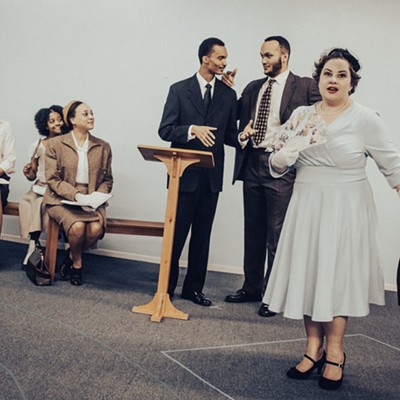On the bright side, The Night Thoreau Spent in Jail is another solid show by Throughline Theatre, and if you have an unconditional love for Henry David Thoreau, this little pageant should satisfy your transcendental needs. Joseph Ryan Yow directs a breezy production on a simple set (co-designed with Jesse Poole-Van Swol), and the 12-actor cast swirls briskly about the stage. The play's anchor is Jordan Matthew Walsh, who plays Thoreau as an animated, quick-witted soothsayer. Walsh shoulders most of the script, gushing monologues like a fountain of youthful wisdom.
As for the play, Thoreau is laughably sanctimonious, more treatise than drama —indeed, more treatise than Walden, Thoreau's actual manifesto. Robert Edwin Lee and Jerome Lawrence composed the script in 1970, and their antiwar agenda has all the subtlety of a Weathermen bomb. The era was already producing a host of crafty, eccentric, anti-establishment heroes, such as Patrick McMurphy, Cool Hand Luke and Hawkeye Pierce, so why not another?
Like the pair's more famous play, Inherit the Wind, Thoreau is outrageously one-sided. Thoreau is the only voice of reason, and a vociferous voice at that. All the other characters are stuttering hypocrites, largely because they don't pick berries in the forest. Emerson is a sellout. Sweet little Ellen is an obedient prude. The schoolteacher is a veritable Nazi. Thoreau's highfalutin' moralizing gets annoying early on, then embarrassing by Act II. In the Vietnam era, this remixed Thoreau must have seemed offbeat and virile. Today, he sounds like a naïve contrarian, who believes disagreement with all others amounts to philosophy.
(I hesitate to even mention Thoreau's interaction with Henry Williams, a runaway slave. Thoreau proclaims that there is "slavery in the North" as well, implicitly comparing overworked white laborers to the whipped, raped, homeless, dehumanized, bought-and-sold bondsmen of the South. I'm sorry, but: No, he didn't.)
Yet as literature, Thoreau is now part of history, like Walden, and I commend Throughline for revisiting its version of things. If the play itself is dated, Thoreau's sentiments are timeless, and the play should provoke some thoughtful conversation. From what I gather, this is Throughline's through-line — low budgets, proud works and plenty to talk about on the ride home.















